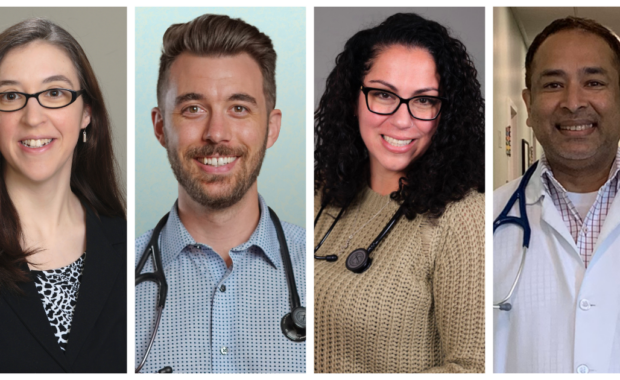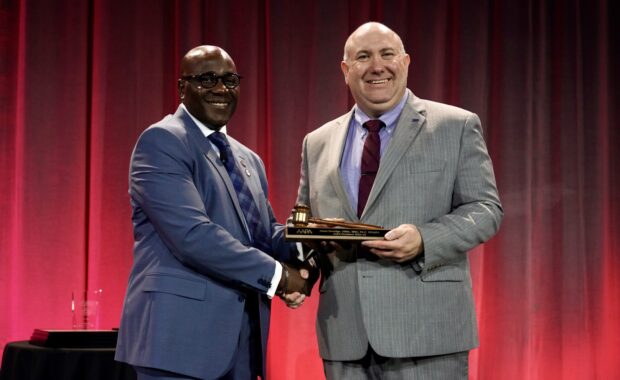Fulbright Scholar Travels to Ireland to Study PAs in the Healthcare Workforce
PA Kris Himmerick focuses their research on the scope of practice for PAs, how satisfied PAs are with their role, and more
August 31, 2023
By Jennifer Walker
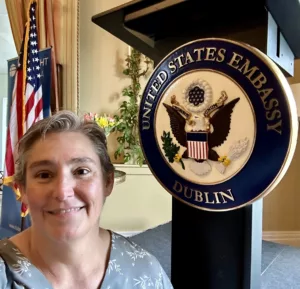
For three months this year, Fulbright Scholar Kris Himmerick, PhD, PA-C—along with their family, including their wife Margarita Delgadillo, PA-C, MPH, and their children, ages 7 and 3—moved to the Republic of Ireland to study how the first graduates from the country’s only PA program were integrating into their healthcare teams. Himmerick went to five towns outside of Dublin to interview PAs and their colleagues about four topics: the scope of practice for PAs, their knowledge and skills, their impact on patient care quality and access, and how satisfied PAs and members of their healthcare teams are with the PA role.
“It’s a really fascinating concept to introduce a new profession into the machine of delivering healthcare,” says Himmerick, who is the director of assessment, accreditation, and sponsored projects at the University of the Pacific School of Health Sciences in Sacramento, California. “I was really intrigued about how it was going and if it looked similar to or differed from how PAs work in the United States.”
Himmerick, who has practiced as a clinician in pediatrics, primary care, and emergency medicine, has also long been drawn to academic research, particularly on the topic of PAs as part of the healthcare workforce. When they applied to the Fulbright Scholar Program, they pitched a topic that revolved around studying the PA profession in its infancy in another country. Himmerick was placed in Ireland, where the faculty at the Royal College of Surgeons in Dublin, including programme director Lisa Mustone Alexander, EdD, MPH, PA-C, have been successful in developing a strong PA education program and advocating for recognition of the profession.
Now back in the U.S., Himmerick says the main idea they are taking away from their research is that PAs are valuable and essential contributors to their healthcare teams. “We heard over and over again from team members about how they couldn’t imagine doing their jobs without PAs on their teams,” Himmerick says. “These PAs are filling gaps and finding ways to be beneficial, to deliver care and to make teams run better, just like all good PAs.”
Shifting Between Patient Care and Academia
It seems fitting that Himmerick, who is from Arizona, found their way back to research after becoming a PA given that they started their career as a benchtop research scientist. From 1998 to 2000, they worked on research and tested drugs related to long-term memory. But, after a while, they began to look for a career in direct patient care.
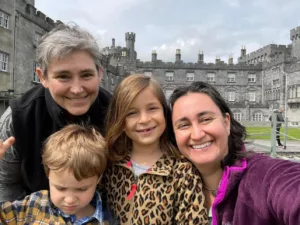
Himmerick, who learned about the PA field from a friend, liked the quick path into medicine and the flexibility that the profession offered. In 2002, they began the PA program at the University of Iowa as a scholarship recipient through the National Health Service Corps Scholarship Program. After graduation, Himmerick spent two years working with The Pediatric Associates in Montrose, Colorado. They then practiced at a federally qualified health center through OLE Health in Napa Valley, California, where they provided care to migrant farm workers and the community.
By 2009, Himmerick was ready to shift into academia. They spent four years on the faculty at the University of California, Davis (UC Davis), where they also maintained a separate clinical practice, then two years at Northern Arizona University in Flagstaff, where they helped develop and launch the school’s PA program.
During this time, Himmerick also completed the PhD program at UC Davis, where they began to focus on research related to PAs in the healthcare workforce. Then, while completing a two-year postdoctoral fellowship at the University of California, San Francisco, they co-wrote a series of three influential reports about the primary care workforce in California. “Those reports helped to leverage more funding for the health workforce pipeline in the state,” says Himmerick, adding that they offered strategies for California to enhance its primary care education pipeline, improve recruitment and retention of primary care clinicians, and more.
But in 2017, after devoting eight years to building their academic career, Himmerick changed course and went back to direct patient care. “I had a young family at the time and academic life was very demanding,” Himmerick says. “So, after all this hard work of preparing to be a researcher and a faculty member, I went back to work in the emergency department for a couple of years. This is a really wonderful thing you can do as a PA, to move in and out of specialties and types of careers.”
By 2020 though, COVID-19 made working in the emergency department riskier and more challenging. Himmerick went back to academia at the University of the Pacific School of Health Sciences. Today, as the director of assessment, accreditation, and sponsored projects, Himmerick supports the 10 programs within the department—including PA, nursing, occupational and physical therapy, clinical nutrition, and social work degrees—in collecting data about their students, faculty, and programs to help prepare for their accreditation and site visits.
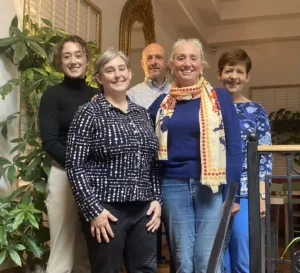
As a Fulbright Scholar, Himmerick was able to go back to their original research interest by focusing on PAs in the healthcare workforce, this time in a country where the profession is somewhat new. Ireland seemed like an ideal fit: The first and only PA education program was introduced there only seven years ago.
Studying the PA Healthcare Workforce in Ireland
Like many healthcare systems, the Health Service Executive in Ireland faces a number of challenges, including access to care and wait times that are “extraordinary,” Himmerick says. But the biggest challenge might be finding clinicians to work in the country: The Economic and Social Research Institute estimates that around an additional 15,000 healthcare providers will be needed in Ireland by 2035 to meet the demands of a growing population. “They have an interesting problem in that a large percentage of the Irish students they train to be physicians and nurses don’t stay in Ireland. They go to work abroad,” Himmerick says. “So, Ireland has an incredible healthcare workforce provider shortage.”
Since 2016, the PA program at the Royal College of Surgeons has graduated 62 people who could begin to fill this shortage (Northern Ireland, a part of the United Kingdom and considered a separate country, also has its own PA program). Although the profession is still in its early stages, there is anecdotal evidence that healthcare teams want to work with PAs, as well as an important pilot study completed by the Royal College of Surgeons that demonstrates there is a role for PAs in the country.
For their Fulbright project about how PAs are integrating into their healthcare teams, Himmerick and their family spent up to a week in each of five Irish towns. There, Himmerick interviewed a total of 25 people, including six PAs, as well as the physicians, nurses, trainees, and administrators who work with each PA. Everyone interviewed was asked the same questions about the four previously mentioned topics. “This allowed me to get a 360 view of what the PA’s role looked like and how they were integrating into each team from all these different perspectives,” says Himmerick, who credits their wife, Margarita, for keeping their kids healthy and happy while trekking around the countryside so Himmerick could work on these interviews.
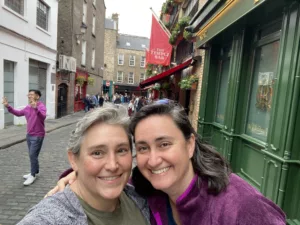
Through this work, Himmerick learned that most of the PAs felt their educational experiences had adequately prepared them for their roles. The rest of their healthcare teams appreciated each PA’s expertise and found the PAs to be very approachable.
But on the other side, Himmerick also heard that some PAs wanted their roles to include more high-complexity, clinical decision-making tasks. “And it wasn’t just the PAs who had that perspective,” says Himmerick, who was also on the faculty at the Royal College of Surgeons during their time in Ireland. “Some of the other members on the team also indicated that PAs are capable of doing more than their current role.”
Part of the reason for this barrier is the newness of the PA field in Ireland, as providers learn to create space for this role within their teams. But, of course, the lack of laws that recognize PAs is the biggest hurdle to overcome. Himmerick was part of a team that wrote the first draft of legislation that would recognize PAs and give them a scope of practice, but this work is still in the early developmental stages.
“PAs are working in a gray area until the laws develop,” Himmerick says. “But virtually all of the graduates have been able to find jobs.”
With their project complete, Himmerick is working on a publication to share the results of their research with PA graduates and educators, as well as with policymakers, in Ireland and to outline steps to creating a viable path for the PA profession in country.

Back at home, Himmerick—who appreciated the cultural exchange aspect of their Fulbright experience, which led to them and their family visiting small Irish farms, zoos, and gardens and interacting with locals—is also applying what they learned to their work in academia, particularly in regard to how PAs are essential members of their healthcare teams in Ireland.
“In every one of the 25 interviews, it was reinforced how great it is to have a PA as part of the team, to be a trusted colleague and a good patient care provider and an advocate,” adds Himmerick. “So, I’m thinking about how this translates not only into delivering patient care, but also into all the things we do. We just don’t do it alone. We can’t take care of patients alone; we can’t educate students alone. It depends on each of us really working as a team. That’s something I’m bringing back to my personal life and my own work.”
Jennifer Walker is a freelance writer in Baltimore, MD. Contact Jennifer at [email protected].
You Might Also Like
Two PAs Get Their ‘Big Break’ in TV and Film Production
Lieutenant and PA Casie Parker Spends One Month at Sea as the Medical Officer for the NOAA Ship Okeanos Explorer
Diving into the Unknown: Becoming PAs in Ireland
Thank you for reading AAPA’s News Central
You have 2 articles left this month. Create a free account to read more stories, or become a member for more access to exclusive benefits! Already have an account? Log in.


